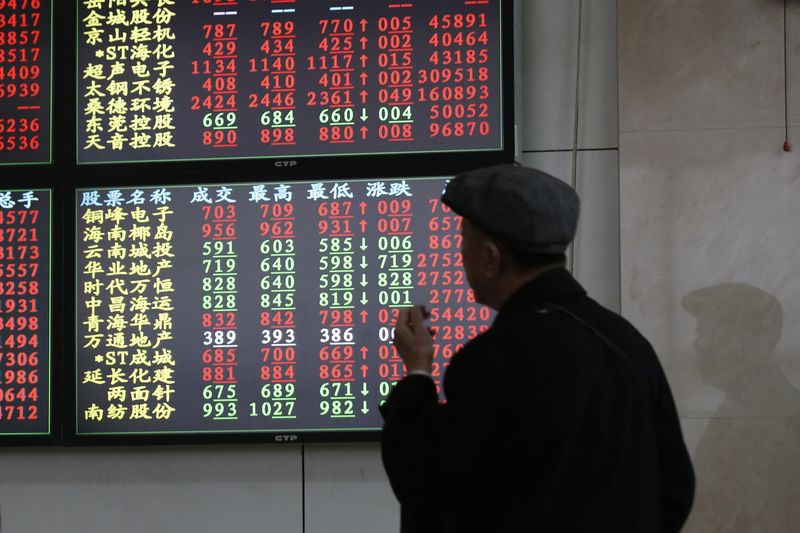* Asian stock markets : https://tmsnrt.rs/2zpUAr4
* Nikkei sheds 3.2 pct, Asia ex-Japan hits 10-month low
* Shanghai index lowest since late 2014 as yuan pressured
* Culprits include high bond yields, Sino-US trade tensions
* Trump calls Fed "crazy" for raising interest rates
* Yen and euro in demand as safe harbours, dollar mixed
By Wayne Cole
SYDNEY, Oct 11 (Reuters) - Asian share markets sank in a sea of red on Thursday after Wall Street suffered its worst drubbing in eight months, a conflagration of wealth that could threaten business confidence and investment across the globe.
It also raised the stakes for U.S. inflation figures due later on Thursday as a high outcome would only stoke speculation of more aggressive rate hikes from the Federal Reserve.
Dealers could find no single trigger for the scare, more a confluence of factors.
"Equity markets are locked in a sharp sell-off, with concern around how far yields will rise, warnings from the IMF about financial stability risks and continued trade tension all driving uncertainty," summed up analysts at ANZ.
MSCI's broadest index of Asia-Pacific shares outside Japan .MIAPJ0000PUS shed 2.7 percent to its lowest in 18 months.
Japan's Nikkei .N225 fell 3.4 percent, the steepest daily drop since March, while the broader TOPIX .TOPX lost around $195 billion in market value.
Shanghai shares .SSEC touched their lowest since late 2014, while China blue chips .CSI300 slid 3 percent.
On Wall Street, the S&P500's sharpest one-day fall since February wiped out around $850 billion of wealth as technology shares tumbled on fears of slowing demand.
The S&P 500 .SPX ended Wednesday with a loss of 3.29 percent and the Nasdaq Composite .IXIC 4.08 percent, while the Dow .DJI shed 2.2 percent.
The blood letting was bad enough to attract the attention of U.S. President Donald Trump, who pointed an accusing finger at the Fed for raising interest rates.
"I really disagree with what the Fed is doing," Trump told reporters before a political rally in Pennsylvania. "I think the Fed has gone crazy."
It was hawkish commentary from Fed policy makers that triggered the sudden sell off in Treasuries last week and sent long-term yields to their highest in seven years.
The surge made stocks look less attractive compared to bonds while also threatening to curb economic activity and profits.
YUAN A FLASHPOINT
The shift in yields is also sucking funds out of emerging markets, putting particular pressure on the Chinese yuan as Beijing fights a protracted trade battle with the United States.
China's central bank has been allowing the yuan to gradually decline, breaking the psychological 6.9000 barrier and leading speculators to push the dollar up to 6.9380 CNH= .
That has forced other emerging market currencies to weaken to stay competitive, and drawn the ire of the United States which sees it as an unfair devaluation.
"The yuan has already weakened significantly, to offset the tariffs announced so far," said Alan Ruskin, Deutsche's global head of G10 FX strategy. "Further weakness could exacerbate concerns of a self-fulfilling flight of capital, and a loss of control."
There was also a danger for the U.S. if Beijing had to intervene heavily to support the yuan.
"China buying yuan and selling dollars would likely entail some selling of U.S. Treasuries at a point where the market is showing some vulnerability, and could be very vulnerable to signs of China liquidation," added Ruskin.
The dollar was already losing ground to both the yen and the euro, as investors favoured currencies of countries that boasted large current account surpluses.
The euro pushed up to $1.1535 EUR= and away from a low of $1.1429 early in the week. The dollar lapsed to 112.20 yen JPY=D3 , a telling retreat from last week's 114.54 peak.
That left the dollar at 95.4397 .DXY against a basket of currencies. USD/
In commodity markets, gold struggled to get any safety bid and edged down to $1,192.92 XAU= .
Oil prices skidded in line with U.S. equity markets, even though energy traders worried about shrinking Iranian supply from U.S. sanctions and kept an eye on Hurricane Michael, which closed some U.S. Gulf of Mexico oil output. O/N
Brent crude LCOc1 fell 76 cents to $82.33 a barrel, while U.S. crude dropped 68 cents to $72.49 CLc1 .
<^^^^^^^^^^^^^^^^^^^^^^^^^^^^^^^^^^^^^^^^^^^^^^^^^^^^^^^^^^^ Asia stock markets
https://tmsnrt.rs/2zpUAr4 Asia-Pacific valuations
https://tmsnrt.rs/2Dr2BQA
^^^^^^^^^^^^^^^^^^^^^^^^^^^^^^^^^^^^^^^^^^^^^^^^^^^^^^^^^^^> (Editing by Shri Navaratnam)
